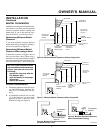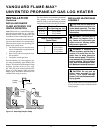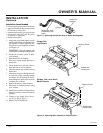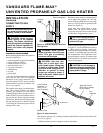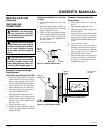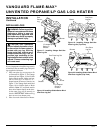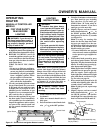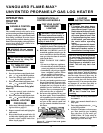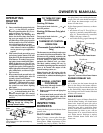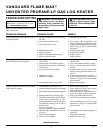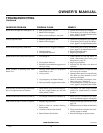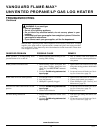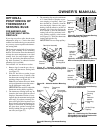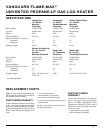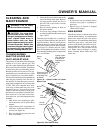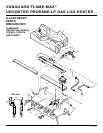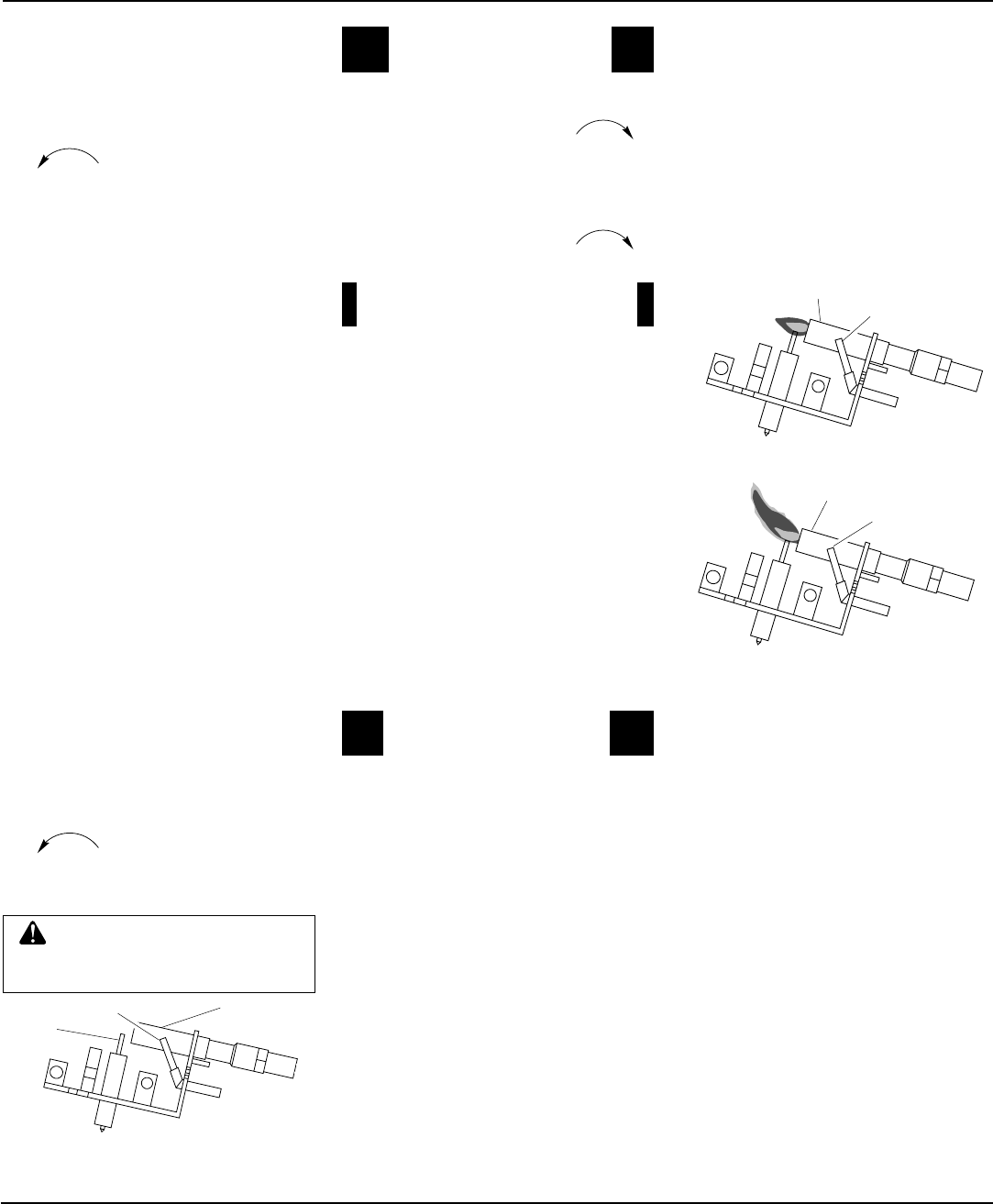
17
105188
OWNER’S MANUAL
INSPECTING
BURNERS
Check pilot flame pattern and burner flame
patterns often.
PILOT FLAME PATTERN
Figure 25 shows a correct pilot flame pat-
tern. Figure 26 shows an incorrect pilot
flame pattern. (
Note:
Appearance of pilot
assembly may vary by model.) The incor-
Thermocouple
Pilot Burner
Figure 25 - Correct Pilot Flame Pattern
Pilot Burner
Thermocouple
Figure 26 - Incorrect Pilot Flame Pattern
BURNER PRIMARY AIR
HOLES
Air is drawn into the burner through the
holes in the fitting at the burner entrance.
These holes may become blocked with dust
or lint. Periodically inspect these holes for
any blockage and clean if needed. Blocked
air holes will create soot.
MAIN BURNER
Periodically inspect all burner flame holes
with the heater running. All slotted burner
flame holes should be open with yellow
flame present. All round burner flame holes
should be open with a small blue flame
present. Some burner flame holes may be-
come blocked by debris or rust, with no
flame present. If so, turn off heater and let
cool. Either remove blockage or replace
burner. Blocked burner flame holes will
create soot.
5. Turn control knob counterclockwise
C-clockwise
to the PILOT position.
Press in control knob for five (5) sec-
onds (see Figure 23, page 16 ).
Note:
You may be running this
heater for the first time after hook-
ing up to gas supply. If so, the con-
trol knob may need to be pressed in
for 30 seconds or less. This will allow
air to bleed from the gas system.
• If control knob does not pop out
when released, contact a qualified
service person or gas supplier for
repairs.
6. With control knob pressed in, press
and release ignitor button. This will
light pilot. The pilot is attached to the
front burner. If needed, keep press-
ing ignitor button until pilot lights.
Note:
If pilot does not stay lit, con-
tact a qualified service person or gas
supplier for repairs. Until repairs are
made, light pilot with match. To light
pilot with match, see Manual Light-
ing Procedure.
7. Keep control knob pressed in for 30
seconds after lighting pilot. After 30
seconds, release control knob.
Note:
If pilot goes out, repeat steps
3 through 7. This heater has a safety
interlock system. Wait one (1) minute
for system to reset before lighting
pilot again.
8. Turn control knob counterclockwise
C-clockwise
to desired heating level. The
burners should light. Set control
knob to any heat level between HI
and LO.
OPERATING
HEATER
Continued
CAUTION: Do not try to adjust
heating levels by using the
manual shutoff valve.
Figure 24 - Pilot
(
Note:
Appearance of pilot assembly may
vary by model.)
Thermocouple
Ignitor
Electrode
Pilot Burner
TO TURN OFF GAS
TO APPLIANCE
Shutting Off Heater
Turn control knob clockwise
Clockwise
to
the OFF position.
Shutting Off Burners Only (pilot
stays lit)
Turn control knob clockwise
Clockwise
to
the PILOT position.
THERMOSTAT CONTROL
OPERATION
(Thermostat-Controlled Models
Only)
The thermostat control knob can be set to
any comfort level between Hi and Lo. The
thermostat will gradually modulate the
heat output and flame height from higher
to lower settings, or pilot, in order to
maintain the comfort level you select.
The ideal comfort setting will vary by
household depending upon the amount of
space to be heated, the output of the
central heating system, etc.
Note:
Selecting the Hi setting with the
control knob will cause the burner to
remain fully on, without modulating down
in most cases.
MANUAL LIGHTING
PROCEDURE
1. Follow steps 1 through 5 under Light-
ing Instructions, page 16.
2. Depress control knob and light pilot
with match.
3. Keep control knob pressed in for 30
seconds after lighting pilot. After 30
seconds, release control knob. Now
follow step 8 above.
rect pilot flame is not touching the thermo-
couple. This will cause the thermocouple to
cool. When the thermocouple cools, the
heater will shut down.
If pilot flame pattern is incorrect, as shown
in Figure 26
• turn heater off (see To Turn Off Gas to
Appliance, manually controlled models,
page 16. Thermostatically controlled
models, this page, column 2)
• see Troubleshooting, pages 18 through 20



